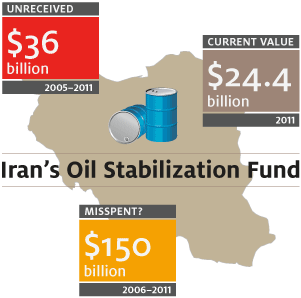
Iran’s Oil and Gas Management
By Antoine Heuty
Understanding Iran's management of oil and gas is vital to assessing the potential impact of international sanctions. Since 2005, oil and gas production has generated over $500 billion in government revenues—but authorities have failed to invest in economic development and have veiled their management in secrecy.
Based on an analysis of data from the Central Bank of Iran and the IMF, Revenue Watch believes the government has violated its own rules for oversight of the revenues. In an unintended consequence, international sanctions have also strengthened the economic power of Iran's Revolutionary Guard Corps, whose expanding role in the oil sector has also marginalized Iran's private sector in the most important part of the economy, further undermining economic development and democracy.

Illustration by Designlounge.